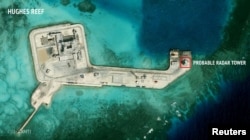President Barack Obama will face a broad range of pressing issues on his 11th trip as president to Asia, with the future of his strategic rebalance to the Asia Pacific and his legacy in that region still uncertain.
With less than five months in office, Obama will travel there for the last time as president, after working throughout his two four-year terms to bolster America’s power and influence in the region.
The U.S. president will join other world leaders for the Group of 20 (G20) summit in Hangzhou, China, and the Association of Southeast Asian Nations Summit and the East Asia Summit in Vientiane, Laos from September 2-8.
The foreign policy rebalance is critical to America’s future security and prosperity, according to Obama.
White House officials said that while in Asia he will repeatedly make “a forceful case” for ratification of the Trans-Pacific Partnership (TPP). The trade deal, signed by 12 Pacific rim nations, is the economic foundation of the so-called pivot.
“TPP is a litmus test for U.S. leadership,” said Ben Rhodes, deputy national security advisor. Without ratification the U.S. “would be ceding the region to countries like China, who do not set the same types of high standards for trade agreements,” he argued.
But whether the U.S. Congress will ratify the deal is very much in doubt during a presidential election year in which trade has been blamed for lost jobs.
Both major party candidates, Republican nominee Donald Trump and Democratic nominee Hillary Clinton, have spoken against it.
Obama is expected to make a final push for ratification after presidential elections in November.
“The chances of doing that are growing slimmer by the day,” said Douglas Paal, vice president for studies at the Carnegie Endowment for International Peace. “If we don’t have that, the rest of the rebalance to Asia looks hollow.”
On the agenda
Obama also will face a long list of tough issues during the G20 summit.
Leaders of the world’s 20 largest economies are expected to have a robust debate about how best to stimulate the sluggish global economy and push ahead against climate change.
Key meetings include talks between Obama and Chinese President Xi Jinping and Turkish President Recep Tayyip Ergodan.
He also likely will speak on the sidelines with Russian President Vladimir Putin.
The U.S.-China talks will cover U.S. concerns about Beijing’s cyber activities, economic practices and aggressive actions in the South China Sea, where it has claimed disputed territory, raising tensions with its Southeast Asian neighbors.
With leadership changes set for next year, it is critical “to stabilize the U.S. relationship with China as they go through simultaneous political transitions in both countries,” Paal said.
“I think the important thing for Obama during his meeting with Xi Jinping is to establish some red lines, things that we will not tolerate,” he added.
White House officials said it will be the last such meeting between Obama and Xi.
The two will “review the state of U.S.-China relations and to try to see where we can make progress,” said Rhodes.
Obama and Erdogan will discuss Turkey’s crackdown since a failed coup attempt, which the Turkish president has blamed on the U.S. Also on the agenda are the fight against Islamic State, instability in Syria and the refugee crisis.
Possible talks between Obama and Putin are expected to focus on the conflict in eastern Ukraine and Moscow’s role in Syria.
The U.S. has urged Russia to persuade President Bashar al-Assad to abide by a cessation of hostilities agreement and allow the flow of humanitarian aid.
Obama will be the first U.S. president to visit Laos when he travels to Vientiane for the ASEAN and East Asia summits on September 5. He will hold talks with that country’s leaders as part of the ongoing effort to build ties with people and develop more trade and investment.
After the meeting, the U.S. leader will deliver a speech on his Asia policy and his vision for America’s future in the Asia Pacific. “I think he'll speak to the fact that we've significantly upgraded our commercial and economic diplomacy in the region, our security presence in the partnerships that we're building, both with allies but also with emerging partners on issues like maritime security and disaster response,” said Rhodes.
He again will press for U.S. ratification of TPP during the remarks.
Obama is scheduled to meet with the Philippines' new president, Rodrigo Duterte, to discuss an international court ruling at The Hague against China’s territorial claims in the South China Sea.
President Obama will seek to reassure Southeast Asian nations about the U.S. commitment to the rebalance.
But progress on the security and diplomatic fronts are not enough, said Matthew Goodman, William E. Simon Chair in Political Economy and Senior Adviser for Asian Economics at the Center for Strategic and International Studies. The future of the rebalance and Obama’s legacy rest on TPP.
“If it doesn’t get ratified then I think his legacy will be seen as mixed at best in Asia,” said Goodman.











